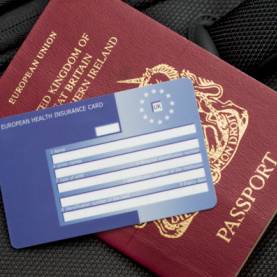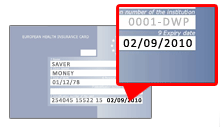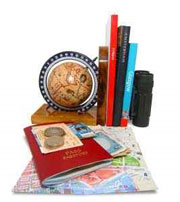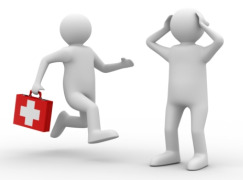The EHIC, or European Health Insurance Card, doesn't cost a penny. It can get you free or discounted medical care in all 27 EU countries, plus a few others. Yet over half the UK population don't have one, plus nearly eight million will expire in 2011, so urgently check yours.
This guide tells you how and where to apply, which countries it's valid in, and the level of cover it entitles you to.
In this guide
Country by country guide
What's an EHIC?

If you're in Europe and you've got an EHIC you�ll be entitled the same treatment that local citizens are entitled to, which is extremely useful in emergencies. It�s completely free and valid for five years; all UK residents are eligible, though residents of the Channel Islands and Isle of Man aren't.
Does it make treatment free?
No. You get treated the same way as a citizen of that country, so if they get free medical treatment you do too; if they pay, you pay the same rates. As this is a reciprocal agreement across Europe, it also means EU citizens can use the NHS in the same way.
It�s also worth noting that the EHIC doesn�t cover you if you're going abroad specifically to get treatment, see more info.
Martin's quick tale:
My own EHIC was a godsend at an Italian friend�s wedding. I was due to make a speech and lost my voice, so I nipped to the local GP at no cost.
Who needs one?
Everybody who is travelling to Europe needs an EHIC. Even if you've already got travel insurance, it's valuable extra protection, even if just for visiting the local GP with a query while away. There are a few important facts to note:
-
 Check yours hasn't expired.
Check yours hasn't expired.
Nearly eight million EHICs are due to expire in 2011, so ensure yours is valid before you go away. The expiry date is on the bottom right. If it's already expired, or is about to, renew it now (see How to apply).
The EHIC replaced the E111 form in 2005, and until March 06 some three year and some five year cards were issued to spread expiry dates. As you can apply for a new card up to six months before the current one ends, it�s worth doing this in advance so you don�t forget. -
Kids must have their own cards.
Though you must be over 16 to apply, every family member requires a card. To apply on behalf of a child, just include them as a 'dependant' in the relevant section of the application and you'll each receive a separate EHIC. -
Keep the card with you at all times.
Absurdly, the terms stipulate you won't be covered if you haven�t got it on you. Don�t leave it behind at the hotel if you�re out and about, and even take it to the beach if you have to. -
You may need to pay and claim later.
Though the EHIC allows you instant free treatment in some countries, in others you'll need to pay and reclaim the money while you're there, or when you get back to the UK. Use the Country by country guide below to find out which applies to you, and call the NHS Overseas Healthcare Team on 0191 218 1999 if you need to make a claim.
Is it a substitute for travel insurance?
 No. While very useful, it�s only about medical cover. It only gives you access to state-run hospitals which, depending on where you travel to, can be few or far between, and more limited.
No. While very useful, it�s only about medical cover. It only gives you access to state-run hospitals which, depending on where you travel to, can be few or far between, and more limited.
The EHIC gives valuable protection but should never be seen as a substitute for travel insurance.
Travel insurance has a much wider level of cover than the EHIC. For example:
-
Using the EHIC doesn�t always mean free treatment.
You may still have to pay a substantial amount in some countries, even in a state hospital. Travel insurance should cover this, though using an EHIC may mean you won't need to pay the excess. -
State hospitals mightn�t be available.
While in the UK emergency treatment tends to be in the NHS, don�t assume this type of coverage will always be available as you may be taken to a private hospital. -
Cancellation, delay, repatriation, baggage loss and theft aren�t covered.
The EHIC is purely a medical policy, yet travel insurance covers many other areas.
It's possible to cover a year's holidays for less than �20.
See Cheap Travel Insurance.
Country by country guide

The EHIC's usable in the EU�s 27 member states, plus a few others. Show your card before treatment, and keep any receipts. The NHS site has detailed country-by-country information on what�s covered in each, see below for a quick summary:
- Austria. Treatment will be free if the doctor's contracted with one of Austria's regional health insurance offices, though you'll be charged if not. However, you can claim up to 80% of this back. See NHS Austria healthcare.
- Belgium. Though the majority of doctors in Belgium provide private healthcare, some offer both. You'll have to pay for healthcare, but you may be able to claim back up to 75% of the charge. See NHS Belgium healthcare.
- Bulgaria. Check before making an appointment whether the doctor is registered with the National Insurance Fund. There's a small charge to see a doctor but you may be able to get this back in the UK. See NHS Bulgaria healthcare.
- Cyprus. Treatment is available from doctors in state healthcare centres. It'll cost two Euros for each visit, but you may be able to claim this back in the UK. See NHS Cyprus healthcare.
- Czech Republic. Make sure the doctor's registered with the CMU. You'll need to pay a small patient contribution, though watch out as you'll have to pay the full cost if the doctor isn't registered. See NHS Czech Republic healthcare.
- Denmark. Doctor consultations are covered, though check whether the doctor's registered with the Danish public health service. If you're charged, you can claim back the full amount. See NHS Denmark healthcare.
- Estonia. You'll need to pay some of the fee for any medical treatment, and this includes home visits. You might be able to claim for this when you arrive back in the UK. See NHS Estonia healthcare.
- Finland. Medical treatment can be provided for free from the local health centre, though some KELA venues may incur charges for specialist treatment. See NHS Finland healthcare.
- France. Make sure the doctor or dentist is registered with France's state healthcare provider before making an appointment. You should be able to claim back approximately 70% of the treatment fees. See NHS France healthcare.
- Germany. Check the doctor provides treatment under the state scheme; find a full list of registered doctors at the local 'Krankenkasse'. There's a fixed charge of ten Euros, though this may be refundable back in the UK. See NHS Germany healthcare.
- Greece. See an IKA-ETAM doctor or dentist to get reduced or free treatment. Consult a private doctor and you'll need to pay charges up front, though you can then claim them from the Greek authorities. See NHS Greece healthcare.
- Hungary. You'll need to go to surgeries contracted with the OEP, though there's a fee of HUF 600 for each visit, and HUF 1000 if it's out of normal treatment hours. These may be refundable in the UK. See NHS Hungary healthcare.
- Iceland. Its health centres provide treatment from 8am to 4pm, and are in all districts of Iceland. There's a charge of IKR 1,000, or IKR 500 if you're on a state pension, which may be refundable in the UK. See NHS Iceland healthcare.
- Ireland. Visit doctors working under the Primary Care Reimbursement Service scheme to get free treatment. To find your nearest, go to your local Health Service Executive office. See NHS Ireland healthcare.
- Italy. Make sure the doctor's registered with the Italian national health service, the SSN, and treatment should usually be free. Surgeries are generally open Monday - Friday, though opening times vary. See NHS Italy healthcare.
- Latvia. Charges apply to see a doctor, though pregnant women receiving treatment to do with their pregnancy won't be charged. Those under 18 also avoid the fees, which may be refundable in the UK. See NHS Latvia healthcare.
- Liechtenstein. Visit a doctor covered by the public health scheme and you'll pay CHF 67, or CHF 33.50 for pensioners and children. See NHS Liechtenstein healthcare.
- Lithunania. Visit a doctor who works with one of the territorial patient funds to get free treatment. Any private healthcare fees are sadly non-refundable. See NHS Lithuania healthcare.
- Luxembourg. You'll need to pay and then claim the cash back from the CMO, the Sickness Insurance Fund for Manual Workers. Hospital stays and medicines are fully funded by the CMO. See NHS Luxembourg healthcare.
- Malta. Go to public health centres to see a doctor. State-provided emergency dental treatment is free, though isn't widely available as most dentists have private practices. See NHS Malta healthcare.
- Netherlands. See a doctor covered by the AGIS Zorgverzekeringen scheme and treatment will normally be free. Children can also receive state-provided dental care, though others will have to pay. See NHS Netherlands healthcare.
- Norway. You'll have to pay a fee. Make sure you see a doctor with a reimbursement arrangment with the NAV. Though the cost is non-refundable in Norway, you may be able to get it back in the UK. See NHS Norway healthcare.
- Poland. You'll be able to visit doctors surgeries between Monday - Friday, 8am - 6pm. Out of these hours a 24-hour medical service is provided by NFZ-contracted health units. See NHS Poland healthcare.
- Portugal. There's no charge for state doctors, dentists or hospitals. If you need a pharmacy, you'll find them across Portugal, open Monday - Friday. See NHS Portugal healthcare.
- Romania. There's normally no charge for a medical consultation. Check the doctor, dentist, pharmacist or hospital is working with the Casa Nationala de Asiguarari de Sanatate. See NHS Romania healthcare.
- Slovakia. Make sure the doctor or dentist is covered by the Slovakian health insurance system. You'll need to pay a contribution if you see a doctor, but emergency dental treatment is free. See NHS Slovakia healthcare.
- Slovenia. Check the doctor's registered with the Health Insurance Institute. You may need to pay a standard contribution, though this may be refundable in the UK. See NHS Slovenia healthcare.
- Spain. State healthcare is free, but check they accept your EHIC card first as some hospitals and health centres also offer private healthcare. See NHS Spain healthcare.
- Sweden. Under 20s receive free treatment, though others will be charged between �8 - �12 per treatment. Make sure you see a doctor working under the public insurance scheme. See NHS Sweden healthcare.
- Switzerland. Check that the doctor's registered with the Swiss public health service. Usually, you'll need to pay in full for treatment and claim a refund later. See NHS Switzerland healthcare.
How do I get one?
There are several ways to register for a card:
- Apply on the EHIC website, or find more info on the NHS website.
- Call 0845 606 2030.
Generally, it'll take about seven to ten days for it to come through, though it's worth applying early so you get it in good time for your holiday. If you�ve lost your card or it�s been stolen call 0845 606 2030, or from abroad call 0044 (0)191 218 1999. For more emergency info, it�s also worth taking the free, printable Little Lifesaver travel guide with you when you�re away.
Beware unofficial websites
Watch out for websites demanding a fee for the EHIC. Search on the internet for �EHIC� and you�ll find sites that describe themselves as �reviewing� or �forwarding� services, charging about �10 to process your application (though some may charge more). They often look official, but scroll to the bottom and you�ll find a tick box asking for cash.
One site�s form requires you to tick, �I agree to pay the sum of �9.90 for the review and forwarding service�. A quick check on the site�s Terms and Conditions reveals this as �non-refundable charges for the provision of the Service�.
ALWAYS use the official site, www.ehic.org.uk, to get yours for free. A Department of Health spokesperson told us:
We're trying to do something about these websites - they are not endorsed by the Department of Health. EHICs are free through the NHS - there's no need to pay.
The Office of Fair Trading (OFT) has taken action against several sites who deceptively sold EHICs in 2010, see the OFT website for more. In July 2011 it also announced new investigations into online websites deceptively selling government services, including the EHIC; see the OFT.
The OFT has told us that although it isn't unlawful to charge for a reviewing and forwarding service, tricking consumers into spending on unwanted services is. If you're concerned about an unofficial EHIC website, contact the OFT on 0845 722 4499 or email enquiries@oft.gsi.gov.uk.
Ask a Question / Forum Discussion















